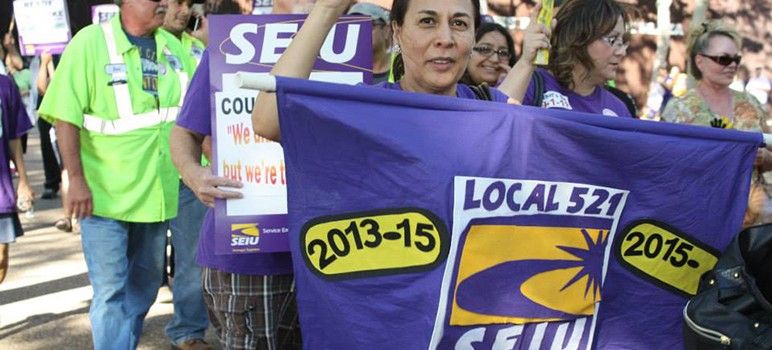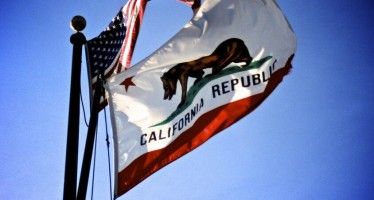California’s largest public employee union strikes deal with Gov. Brown
 Gov. Jerry Brown came to an agreement with SEIU 1000, resolving a crisis over negotiations with the public employee union, California’s biggest. The bargain struck came relatively close to Brown’s initial offer, sharpening the ongoing debate over how best to budget for wages, pensions and health care for the state’s government workers.
Gov. Jerry Brown came to an agreement with SEIU 1000, resolving a crisis over negotiations with the public employee union, California’s biggest. The bargain struck came relatively close to Brown’s initial offer, sharpening the ongoing debate over how best to budget for wages, pensions and health care for the state’s government workers.
“Contract talks began eight months ago, with workers demonstrating for a higher wage increase than Brown offered,” the Sacramento Bee recalled. “In June, the union’s board of directors approved a new stipend for SEIU’s elected leaders, substantially increasing the pay of President Yvonne Walker and three union vice presidents. In August, a dissident group of SEIU members filed a failed petition to recall those leaders. SEIU’s contract expired in July and the union hosted a series of forums where its active members reiterated their request for a higher wage increase than Brown offered. In November, union members authorized a strike over the contract.”
Disruption prevented
SEIU 1000 planned what would have been a high-profile strike with the potential to embarrass the governor. “Union members voted last month to support a one-day strike after leaders said the state had refused to budge from its opening offer on compensation — 12 percent wage increases over four years that the union said would be offset by a 3.5 percent employee contribution to retirees’ health care,” as the Associated Press reported. “The strike that had been planned for Monday threatened to disrupt operations around the state on the same day newly elected lawmakers were to take the oath of office in Sacramento.”
But Brown pushed back forcefully enough to prevent the action from materializing. “Brown’s administration maintained that the strike was an illegal violation of the union’s contract and sought a court order to block it. A Sacramento County judge declined to issue an injunction on Friday,” the wire added. “Hours later, union leaders called off the strike, saying negotiators from both sides felt they had found a pathway forward.”
Alerting employees to the possibility of punishment, the Department of Transportation had issued a blunt memo. “You are permitted to participate in informational picketing if you are doing so on your own time (e.g. before or after work, or if you have been approved for leave),” it read, cautioning that “employees who participate in an illegal job action, may be subject to disciplinary action, which may include time recorded as absence without leave.”
Claiming victory
In his remarks on the agreement, Brown, famous in California politics for protecting his liberal bona fides while consistently curbing enthusiasm on his left for ambitious spending projects, again invoked a spirit of caution and foresight. “The economy is uncertain,” he warned, according to Capital Public Radio. “The revenue stream is not everything we would like, so we do need some prudence. I’ve always said that and we’ve had the seven fat years and we may be coming into the seven lean years, so that dictates how I look at all these things.” SEIU had claimed Sacramento enjoyed more than enough revenue to swell its benefits.
“The deal calls for an 11.5 percent raise over three years starting next July, and a $2,500 signing bonus upon ratification,” the station noted. “But it also requires union members to begin contributing to their retiree health care benefits. The contributions will begin in 2018 and phase in over three years.”
Although the agreement tilted more toward Brown’s baseline than SEIU’s, union officials have presented the outcome as a win. “This is a victory we achieved by thousands of members standing together across the state, taking action in our worksites, and having an unrelenting willingness to strike if it became necessary,” Local 1000 president Yvonne Walker said in a statement, the Bee reported, calling the result “a contract we can all be proud of.”
Related Articles
Regulators to consider breaking up scandal-plagued PG&E
A California Public Utilities Commission report that Pacific Gas & Electric failed to fulfill its responsibilities to properly maintain natural
Hearing details massive state waste
March 25, 2010 By KATY GRIMES Sometimes the most informative legislative hearings are the informational hearings. No vote is taken,
CA economically anxious, politically divided
A new series of polling questions revealed widespread unease among Californians, regardless of party. But economic anxiety concentrated inland, away from




